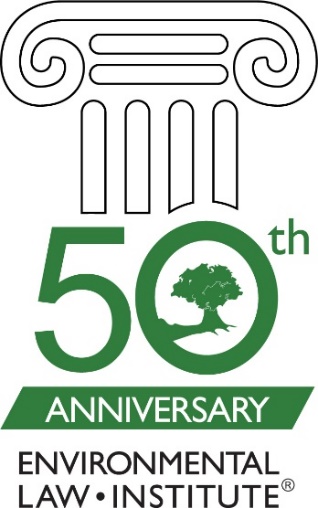(Washington, D.C.) — May is American Wetlands Month, a time to celebrate the vital importance of wetlands to our nation's ecological, economic, and social health and to educate people about the value of wetlands as a natural resource. While the Environmental Law Institute’s Wetlands Program works year-round to provide professionals and the public with timely, balanced information on wetlands law, policy, science, and management, ELI will be taking a closer look at “Wetlands Protection and the Hydrologic Circle” throughout the month of May as we continue to offer special events, programs, and publications in commemoration of our 50th Anniversary.

On May 7, ELI will host an anniversary seminar, Rapanos v. United States: Implications for the Future of Wetlands Protection, where the winners of our National Wetlands Awards will examine the U.S. Supreme Court’s 2006 Rapanos decision and the Trump Administration’s proposed “waters of the United States” rule. Later that day, ELI will host the 30th Annual National Wetlands Awards, recognizing those who have demonstrated extraordinary commitment to the conservation and restoration of our nation’s wetlands. ELI will recognize the awardees for their individual achievements in six categories: Business Leadership; Conservation and Restoration; Education and Outreach; Landowner Stewardship; Science Research; and State, Tribal, and Local Program Development. New this year is a seventh category—30th Anniversary Lifetime Achievement.
ELI will also host two webinars on the science, policy, and practice of stream compensatory mitigation. On May 2, experts will look at stream restoration for multiple purposes, including endangered species conservation, water quality improvement goals, and natural resources damages restoration. And on May 16, panelists will examine approaches to evaluating the performance of stream restoration projects and compensatory mitigation programs over the long term. Both webinars are part of a multi-part webinar series on stream compensatory mitigation.
In the May/June issue of ELI’s policy journal, The Environmental Forum, editor Stephen Dujack comments on the famous Cuyahoga River fire of June 22, 1969—the spur that started debate on pollution across the nation, and led to passage of the Clean Water Act three years later. Also this month, ELI is co-sponsoring the ALI-CLE Clean Water Act Conference in Washington, D.C., where panelists will discuss not only recent programmatic, litigation, and regulatory developments affecting the protection of the nation’s waterways and wetlands, but also the larger, emerging issues that will strongly influence water law and practice in the years to come.
ELI also has a wealth of information for communities looking to mitigate future flooding—including through voluntary buyouts of flood-damaged properties under FEMA’s Hazard Mitigation Grant Program. And a recent article from the Environmental Law Reporter’s News & Analysis, Changing the National Flood Insurance Program for a Changing Climate, assesses the current state of the National Flood Insurance Program and proposes strategies to amend it in light of the increased flooding risks that are due in part to the warming climate.
Of course, ELI’s work spans the globe. Just last month, ELI posted a blog about wastewater management services in off-grid communities around the world. And check out this video about the work ELI’s Judicial Training Program has done to protect Indonesia’s peatlands and water resources.
ELI traces its origins to a national conference on the emerging field of environmental law held at the Airlie House in Virginia in September 1969. Often described as a one-of-a kind environmental law think-and-do tank, ELI continues to effect change through its work as a premier environmental law educator, convener, publisher, and research engine as we enter our 50th year.
Be sure to visit https://www.eli.org/eli-50th-anniversary throughout the year for details and updates.